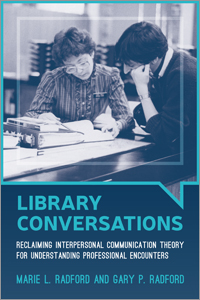
Primary tabs
You don't need to be an ALA Member to purchase from the ALA Store, but you'll be asked to create an online account/profile during checkout to proceed. This Web Account is for both Members and non-Members. Note that your ALA Member discount will be applied at the final step of the checkout process.
If you are Tax-Exempt, please verify that your account is currently set up as exempt before placing your order, as our new fulfillment center will need current documentation. Learn how to verify here.
- Description
- Table of Contents
- About the authors
- Reviews
The importance of being "fully present" in face-to-face as well as virtual interactions in the complex, challenging, and rapidly changing work environment of today's libraries cannot be overstated. It means the difference between conversations that are clear, non-confrontational, and productive and those that are unfocused, awkward, or even threatening. From the reference desk and the community meeting to the board room, the human resource office, and the conference table, effective interpersonal communication lies at the center of the profession. Offering analysis applicable to all types of library situations, this book
- describes a number of theoretical frameworks for understanding interpersonal communication, spanning Aristotle, John Locke, Ruesch and Bateson, Watzlawick and his colleagues, and Erving Goffman;
- uses examples from all different types of library interpersonal encounters, including those with colleagues, the public, managers, and subordinates, to discuss how these historical frameworks apply to libraries and the world of information science;
- combines theory with decades-long empirical research gathered by the authors and their colleagues; and
- offers an in-depth examination of the reference encounter, introducing a content/relational model of success illustrated with examples from librarians and library users.
By applying the insights provided here to daily communication practice, libraries everywhere can build positive relationships with library users, the communities they serve, and among their own staff.
Preface
Acknowledgments
List of Illustrations
Part 1 Reclaiming Theory for Library Contexts
Chapter 1 Interpersonal Communication as Practical Wisdom: Reclaiming Aristotle's Nicomachean Ethics for the Professional Sphere
Chapter 2 Interpersonal Communication as Civil Communication: Reclaiming John Locke's An Essay Concerning Human Understanding
Chapter 3 A Relational View of Interpersonal Communication: Reclaiming Ruesch and Bateson's Communication: The Social Matrix of Psychiatry
Chapter 4 An Interactional View of Interpersonal Communication: Reclaiming Watzlawick, Beavin Bavelas, and Jackson's Pragmatics of Human Communication
Part 2 Applying Theory to Reference Encounters
Chapter 5 Interpersonal Communication as Face-Work within Reference Encounters Reclaiming Erving Goffman's On Face-Work
Chapter 6 A Relational Model of Interpersonal Communication for Face-To-Face and Virtual Communication in Reference Encounters
Chapter 7 What Did We Learn?
Appendix: Physics/Bumper Car Transcript
About the Authors
Marie L. Radford
Marie L. Radford is Chair of the Department of Library and Information Science at Rutgers University, New Jersey. She is an award-winning author whose books include Library Conversations: Reclaiming Interpersonal Communication Theory for Understanding Professional Encounters (with Gary Radford) and Research Methods in Library and Information Science, Sixth Edition (with Lynn S. Connaway). Radford gives frequent keynote speeches and presentations at national and international library conferences, and she has published extensively in prestigious LIS journals. She has presented numerous workshops and webinars on such topics as interpersonal communication in library contexts, service excellence, time management, managing change, conflict management, and positive approaches to problematic people. She is coprincipal investigator of the “Seeking Synchronicity” (with Lynn Silipigni Connaway) and “Cyber Synergy” (with Lynn Silipigni Connaway and Chirag Shah) grant projects funded by the IMLS, Rutgers University, and OCLC. She received the 2010 ALA/RUSA Mudge Award for distinguished contributions to reference service.
Gary P. Radford
Gary P. Radford is professor and chair of the Department of Communication Studies at Fairleigh Dickinson University, Madison, New Jersey. He serves as editor-in-chief of the Atlantic Journal of Communication, and is past chair of the Philosophy and Communication Division of the National Communication Association. His other books include On the Philosophy of Communication, On Eco, and (as coeditor) Transgressing Discourses: Communication and the Voice of the Other.
"With examples of both face-to-face and virtual interactions in the text, the book does well providing concrete examples of reframing interactions for professional use. Yet, the clearest comment is that interpersonal communication cannot be replicated: examples can be provided, theories tested, research discussed, but it is what the communicants do and how the librarian connects theory and practice that provides the benefit."
— VOYA
"A satisfying combination of intellectual and practical, this work will appeal to librarians in public service positions and to those teaching or mentoring students preparing to join the profession."
— Library Journal
"As libraries move into greater service roles, the value of good communication is critical for our overall success ... I found this to be an outstanding book, especially for library administrators and those who manage any public service operations in a library ... this is a book that I would definitely want on my personal or library bookshelf."
— Against the Grain


